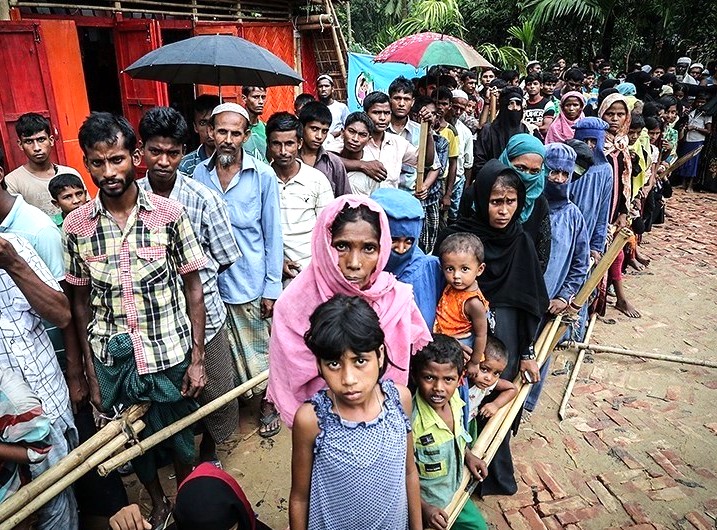According to the Associated Press, 15 Christians, estimated to have been detained at least 40 Rohingya refugees (Burma) from Myanmar (Burma), who were detained in New Delhi on May 8th, reported.
Indian authorities provided refugees, including elderly people, children and women, with life jackets before throwing them into the sea near the Indian maritime border with Myanmar.
The refugees swam on the coast of Myanmar, but a UN Human Rights Commissioner said their location was unknown, according to an agency reporter’s statement on Thursday (May 15).
On Friday (May 16), the Associated Press learned from five Rohingya refugees that their families were detained on May 6th and that on May 8th, Indian Navy crew members flew to carriers of aircraft that were thrown into the sea. The group included 15 Christians, a relative told the Associated Press.
The Rohingya, a predominantly Muslim ethnic group, have been persecuted for a long time in both Myanmar and India, as well as those who converted to Christianity. India has an estimated 40,000 Rohingya refugees who fled persecution in Myanmar.
Tom Andrews, the UN Special Rapporteur on Human Rights in Myanmar, called India’s actions “blatantly ignore the lives and safety of those who need international protection” and “outrageous.”
“This kind of cruel behavior is a humiliation against human decency and would represent a serious violation of the principle of non-reflexivity. It is the fundamental doctrine of international law that prohibits a state from returning it to a territory that faces a threat to its own lives and freedom,” Andrews said in a statement according to the Associated Press.
The UN Human Rights Commissioner said it has appointed UN experts to investigate what it called “ruthless and unacceptable conduct.”
“The UN agency has urged the Indian government to refrain from “inhuman and life-threatening treatment of Rohingya refugees, including repatriation to dangerous situations in Myanmar,” the AP reported.
The news service cited refugee lawyer Dilawar Hussain, saying the family filed a petition with the top courts of India, urging the government to arrange for a return to New Delhi. The Indian Navy and the Ministry of Foreign Affairs declined to comment, the Associated Press reported.
Indian refugees, a relative of one of those forced into the sea, said most of the people who were returned were registered with the United Nations High Commissioner of India and were detained by Indian authorities under the pretext of collecting “biometric data.”
The unidentified refugee for security reasons said he received a call from his brother on May 8 after Castoff swam to Myanmar and borrowed a call from a local fisherman. Castoff told his brother that Indian officials gave them life jackets and swam to an island on Myanmar’s territory, removing their detention and blindfolding, the AP reported.
Another refugee called the New Delhi brother was pushed into the sea and Indian Navy officials told him they had beaten some of the group’s Rohingya refugees. The AP said this or other claims could not be independently verified, and that a spokesman for the military-led government in Myanmar did not immediately respond to requests for emails of comments.
Myanmar denied citizenship by deeming the Rohingya as immigrants from Bangladesh, but the Rohingya claimed that they were indigenous peoples in western Myanmar. Myanmar’s population was estimated at 1.4 million before Rohingya genocide in 2017, with more than 740,000 Rohingya fled to Bangladesh.
Myanmar authorities have imposed restrictions on the state’s education and movement and access to civil servants’ jobs.
UN officials and the Human Rights Clock describe the persecution of the Rohingya in Myanmar as a cleansing of ethnic groups. A UN investigation found evidence of an increase in the inciting hatred and religious intolerance by ultranationalist Buddhists against the Rohingya, and Myanmar security forces exposed them to summary executions, loss of failure, arbitrary arrests, restraints, torture and abuse and forced labor against the community.
India’s Rohingya refugees face persecution and attacks from Hindu nationalist groups.
According to the CIA Factbook, Myanmar’s population is 87.9%, Buddhists are 87.9%, Christians are 6.2%, Muslims are 4.3%, Muslims are 0.8%, and Hindus are 0.5%.
